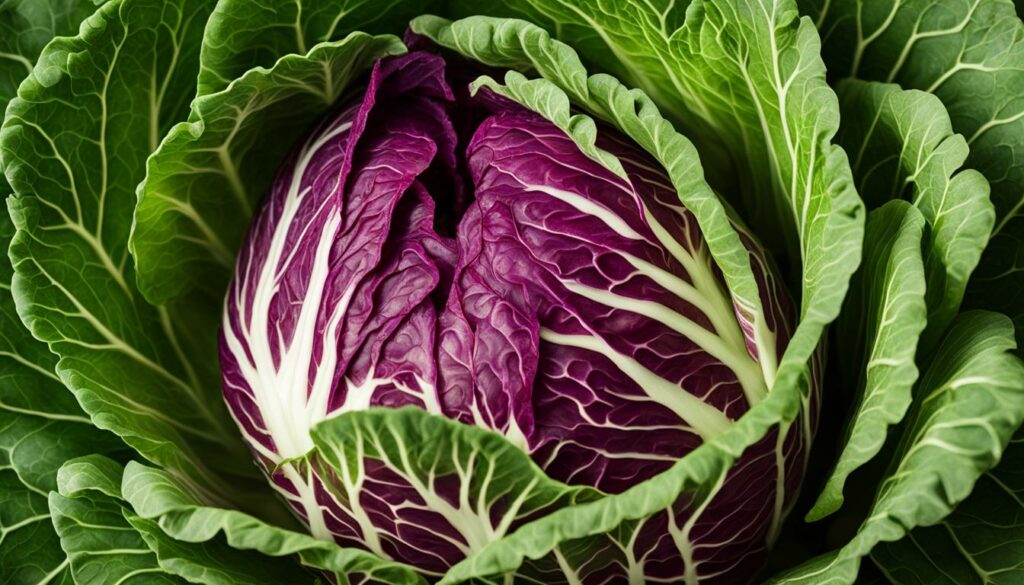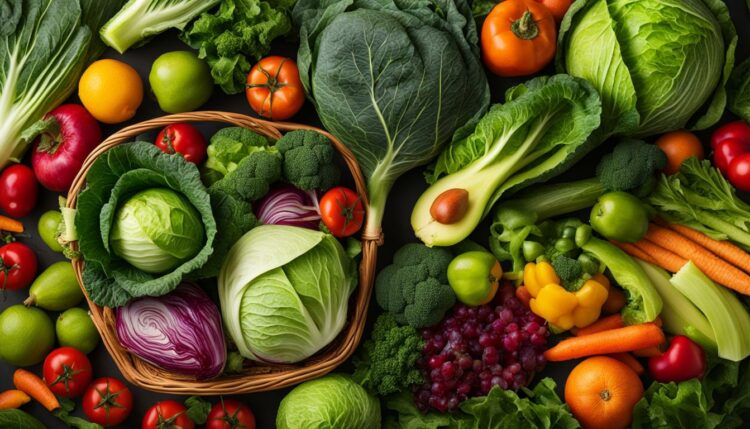Cabbage is a versatile vegetable that not only adds flavor and crunch to meals but also offers a plethora of health benefits. Whether enjoyed raw in salads or cooked in soups and stir-fries, cabbage is a nutritional powerhouse packed with essential vitamins, minerals, and antioxidants.
One of the key health benefits of cabbage is its impressive nutrient profile. It is a rich source of vitamins C and K, folate, and dietary fiber. These nutrients play crucial roles in supporting various bodily functions, including immunity, blood clotting, and digestion.
But the benefits of eating cabbage go beyond its nutritional content. Cabbage has been linked to cancer prevention, thanks to its high antioxidant levels and phytonutrients. It also supports digestive health, heart wellness, weight management, inflammation reduction, and detoxification.
With its low-calorie content and diverse nutrient composition, cabbage can be a valuable addition to any diet, promoting overall health and well-being.
Key Takeaways:
- Cabbage is an incredibly nutritious vegetable packed with essential vitamins and minerals.
- It is rich in antioxidants and phytonutrients that contribute to cancer prevention.
- Cabbage supports digestive health, heart wellness, weight management, inflammation reduction, and detoxification.
- Adding cabbage to your diet can be an easy way to optimize your overall health.
- Enjoy cabbage raw in salads, cooked in various dishes, or even in the form of cabbage juice for an added health boost.
The Nutritional Powerhouse: Cabbage’s Impressive Nutrient Profile
Cabbage is a nutritional powerhouse, packed with essential vitamins and minerals. It is a great source of vitamin C, vitamin K, vitamin B6, folate, and dietary fiber.
Cabbage also contains powerful antioxidants like flavonoids and anthocyanins, which help protect against oxidative damage. Its low-calorie content and high nutrient density make it an excellent choice for maintaining optimal health.
Let’s take a closer look at the impressive nutrients found in cabbage:
| Nutrient | Amount per 1 cup (89g) |
|---|---|
| Vitamin C | 36.6mg |
| Vitamin K | 22.4mcg |
| Vitamin B6 | 0.1mg |
| Folate | 29.1mcg |
| Dietary fiber | 2.2g |
Cabbage’s antioxidants, such as flavonoids and anthocyanins, play a crucial role in protecting the body against oxidative damage. These antioxidants help neutralize harmful free radicals and reduce the risk of chronic diseases.
“Cabbage is a true nutritional powerhouse, providing a wide range of vitamins, minerals, and antioxidants that support overall health and well-being.”
With its impressive nutrient profile, cabbage can be a valuable addition to any diet. Whether you enjoy it raw in salads, sautéed, or in soups, you can reap the many health benefits it offers.
Next, let’s explore how cabbage’s cancer-fighting properties can contribute to a healthier lifestyle.
Cancer Prevention and Cabbage: A Strong Connection
Consuming cabbage can be a powerful ally in your quest for cancer prevention. Studies have shown that incorporating cabbage into your diet may help reduce the risk of various types of cancer, including colon, breast, and prostate cancers.
The health benefits of cabbage in cancer prevention can be attributed to its rich content of antioxidants and phytonutrients, such as glucosinolates. These compounds play a vital role in fighting cancer by neutralizing carcinogens, protecting against DNA damage, and reducing inflammation in the body.
Research suggests that the regular consumption of cabbage as part of a balanced diet can contribute to overall cancer preventive measures. Incorporating this nutrient-packed vegetable into your meals can provide a natural and delicious way to support your health and well-being.

Note: The image above showcases the nutritional properties of cabbage, highlighting its health benefits. The versatile vegetable is known for its cancer-fighting properties, making it a valuable addition to your diet for cancer prevention.
Supporting Digestive Health: Cabbage’s Fiber and Gut Benefits
When it comes to optimizing digestive health, cabbage is a vegetable that can truly make a difference. One of the key reasons for this is its high fiber content, which plays a vital role in maintaining a healthy digestive system.
Fiber is essential for regulating bowel movements and preventing constipation. It adds bulk to the stool, helping it move through the digestive tract more efficiently. This promotes regularity and prevents discomfort.
Moreover, cabbage contains specific compounds that have anti-inflammatory properties. These compounds can help reduce inflammation in the digestive tract, easing discomfort and promoting overall gut wellness.
Another way cabbage supports digestive health is through its ability to promote the growth of beneficial gut bacteria. A healthy balance of gut bacteria is crucial for optimal digestion, nutrient absorption, and immune function.
By consuming cabbage, you can nourish and support the growth of these beneficial bacteria, enhancing the wellness of your gut.
Incorporating cabbage into your diet is a practical and delicious way to maintain a healthy digestive system and reduce the risk of digestive diseases.
Whether enjoyed raw in salads, fermented for sauerkraut or kimchi, or cooked in stir-fries and soups, cabbage offers a versatile range of culinary possibilities to suit different tastes and preferences.
The Fiber Content of Different Cabbage Varieties (per 100g)
| Cabbage Variety | Dietary Fiber |
|---|---|
| Green Cabbage | 2.5g |
| Red Cabbage | 2.2g |
| Napa Cabbage | 1.2g |
Heart Health and Cabbage: The Connection You Need to Know
Cabbage offers a myriad of benefits for heart health, making it a valuable addition to your diet.
One reason cabbage is beneficial for the heart is its high concentration of anthocyanins and other phytonutrients. These compounds have been linked to a lower risk of cardiovascular diseases, such as heart disease and stroke.
Additionally, cabbage is rich in sterols, which are plant compounds that can help lower “bad” cholesterol levels. High levels of LDL (low-density lipoprotein) cholesterol can increase the risk of heart disease, while sterols can help counteract this effect by reducing cholesterol absorption in the intestines.
Moreover, cabbage is a low-calorie vegetable that fits well into weight loss diets. Its high fiber content contributes to a feeling of fullness, helping control appetite and promote weight management. By including cabbage in your meals, you can nourish your body while supporting your weight loss goals.
Furthermore, cabbage contains vitamin K, which plays a crucial role in bone health. Strong and healthy bones are essential for overall wellness, especially as we age. The vitamin K in cabbage supports bone density and may help reduce the risk of osteoporosis and fractures.

By incorporating cabbage into your diet, you can enjoy not only its delicious flavors but also its heart-healthy benefits and support for bone wellness.
From Weight Management to Inflammation Reduction: Cabbage’s Versatility
Cabbage’s versatility extends beyond its nutritional benefits. Its low-calorie and high-fiber content make it an excellent choice for weight management, promoting a feeling of fullness and aiding in portion control.
Cabbage also contains anti-inflammatory compounds, such as anthocyanins, which can help reduce inflammation throughout the body. Incorporating cabbage into your diet can support multiple aspects of your health, from weight management to inflammation reduction.
When it comes to controlling one’s weight, cabbage is a health-conscious individual’s best friend. With its low-calorie nature and high-fiber content, cabbage fills you up without adding excess calories. It can be an excellent addition to weight loss diets as it provides volume and satiety without compromising nutrition.
Furthermore, cabbage is packed with properties that help fight inflammation. Anthocyanins, which give cabbage its vibrant purple and red colors, possess potent anti-inflammatory effects.
These compounds can help reduce inflammation throughout the body and promote overall wellness. Including cabbage in your meals regularly can be a simple yet effective way to address inflammation-related health concerns.
Detoxification and Skin Health: Cabbage’s Added Benefits
Cabbage offers additional benefits related to detoxification and skin health. Incorporating cabbage into your diet or consuming cabbage juice can provide these additional health benefits.
The Power of Cabbage Juice
Cabbage juice, with its high vitamin C content, can support skin health by promoting collagen production and protecting against free radical damage. Collagen is a protein that helps maintain the structure and elasticity of the skin, promoting a youthful and radiant appearance.
Additionally, the antioxidants present in cabbage juice help combat oxidative stress, which can lead to premature aging and skin damage. Regular consumption of cabbage juice can contribute to a healthier complexion and improve the overall health of your skin.
Cabbage and Detoxification
Cabbage contains sulfur and other compounds that aid in the body’s natural detoxification processes. These compounds help eliminate toxins and promote overall skin health. Detoxification is essential as it helps to remove harmful substances from the body, supporting the proper functioning of organs and systems.
By incorporating cabbage into your diet, whether raw or cooked, you can support your body’s detoxification processes and enhance your overall well-being. The high fiber content in cabbage also promotes healthy digestion, further aiding in detoxification.
“Cabbage juice is a powerful tool for detoxification and promoting skin health. Its high vitamin C content can improve collagen production and protect against free radicals, while its detoxifying properties help eliminate toxins from the body.”
Conclusion
Cabbage is a remarkable vegetable that offers a multitude of amazing health benefits. With its impressive nutrient profile and cancer-fighting properties, cabbage stands out as a versatile and nutritious addition to any diet. Its high fiber content promotes digestive health, while its antioxidants contribute to heart wellness and weight management.
Additionally, cabbage aids in detoxification and supports skin health. Whether consumed raw, cooked, or in the form of cabbage juice, this humble vegetable is a powerhouse of nutrition that can unlock the key to optimal health.
By embracing the benefits of eating cabbage, you can make it a staple in your meals and enjoy the incredible advantages it offers. Incorporate cabbage into your diet to experience its amazing health benefits firsthand.
From its rich nutrient content to its ability to prevent cancer, support digestion, maintain heart health, aid in weight management, and promote detoxification and skin health, cabbage is truly a superfood that can supercharge your overall wellness.
Make cabbage a regular part of your menu and harness its extraordinary potential for your health and wellbeing.
Discover the wonders of cabbage and its exceptional health benefits. Whether you choose to add it to salads, stir-fries, or enjoy it as a refreshing juice, cabbage is a simple yet powerful way to enhance your overall health.
Don’t miss out on the opportunity to improve your well-being with this incredible vegetable. Experience the amazing health benefits of cabbage and embark on a journey to a healthier and happier you.
FAQ
What are the health benefits of cabbage?
Cabbage offers numerous health benefits, including cancer prevention, digestive health support, heart health benefits, weight management aid, inflammation reduction, and detoxification effects.
What nutrients does cabbage contain?
Cabbage is a nutritional powerhouse, rich in vitamins and minerals such as vitamin C, vitamin K, vitamin B6, folate, and dietary fiber. It also contains powerful antioxidants like flavonoids and anthocyanins.
Can cabbage help prevent cancer?
Yes, consuming cabbage has been linked to a reduced risk of various types of cancer, thanks to its antioxidants and phytonutrients that help neutralize carcinogens, protect against DNA damage, and reduce inflammation in the body.
How does cabbage support digestive health?
Cabbage is a fantastic source of dietary fiber, which promotes a healthy digestive system. Its fiber content helps regulate bowel movements, prevent constipation, and support a healthy gut. It also contains compounds that reduce inflammation in the digestive tract and promote beneficial gut bacteria growth.
What are the heart health benefits of cabbage?
Cabbage’s high concentration of anthocyanins and other phytonutrients is associated with a lower risk of cardiovascular diseases. It is also rich in sterols that can help lower “bad” cholesterol levels. Additionally, its low-calorie and high-fiber content make it beneficial for weight management, which is important for heart health.
How can cabbage aid in weight management and inflammation reduction?
Cabbage is low in calories and high in fiber, making it an excellent choice for weight management. Its high antioxidant content, including anthocyanins, helps reduce inflammation throughout the body, supporting overall wellness.
Does cabbage have detoxification and skin health benefits?
Yes, cabbage offers additional benefits related to detoxification and skin health. Cabbage juice, with its high vitamin C content, can support skin health by promoting collagen production and protecting against free radical damage.
Cabbage also contains compounds that aid in the body’s natural detoxification processes, promoting overall skin health.
What are the overall health benefits of cabbage?
Cabbage is a versatile and nutritious vegetable that can support overall wellness. It offers a range of benefits, from its impressive nutrient profile to its cancer-fighting properties, digestive health support, heart health benefits, weight management aid, inflammation reduction, and detoxification effects.




